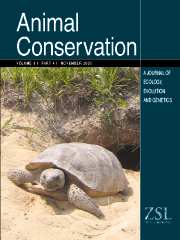Crossref Citations
This article has been cited by the following publications. This list is generated based on data provided by
Crossref.
McClanahan, Tim
2006.
Coral Reef Conservation.
p.
147.
Rhodes, K. L.
and
Tupper, M. H.
2007.
A preliminary market-based analysis of the Pohnpei, Micronesia, grouper (Serranidae: Epinephelinae) fishery reveals unsustainable fishing practices.
Coral Reefs,
Vol. 26,
Issue. 2,
p.
335.
Monte‐Luna, Pablo del
Lluch‐Belda, Daniel
Serviere‐Zaragoza, Elisa
Carmona, Roberto
Reyes‐Bonilla, Héctor
Aurioles‐Gamboa, David
Castro‐Aguirre, José Luis
Próo, Sergio A. Guzmán del
Trujillo‐Millán, Oscar
and
Brook, Barry W.
2007.
Marine extinctions revisited.
Fish and Fisheries,
Vol. 8,
Issue. 2,
p.
107.
Turner, R. A.
Cakacaka, A.
Graham, N. A. J.
Polunin, N. V. C.
Pratchett, M. S.
Stead, S. M.
and
Wilson, S. K.
2007.
Declining reliance on marine resources in remote South Pacific societies: ecological versus socio-economic drivers.
Coral Reefs,
Vol. 26,
Issue. 4,
p.
997.
Hamilton, R. J.
Adams, S.
and
Choat, J. H.
2008.
Sexual development and reproductive demography of the green humphead parrotfish (Bolbometopon muricatum) in the Solomon Islands.
Coral Reefs,
Vol. 27,
Issue. 1,
p.
153.
Pinnegar, John K.
and
Engelhard, Georg H.
2008.
The ‘shifting baseline’ phenomenon: a global perspective.
Reviews in Fish Biology and Fisheries,
Vol. 18,
Issue. 1,
p.
1.
Rochet, Marie-Joëlle
Prigent, Magali
Bertrand, Jacques A.
Carpentier, André
Coppin, Franck
Delpech, Jean-Paul
Fontenelle, Guy
Foucher, Eric
Mahé, Kelig
Rostiaux, Emilie
and
Trenkel, Verena M.
2008.
Ecosystem trends: evidence for agreement between fishers' perceptions and scientific information.
ICES Journal of Marine Science,
Vol. 65,
Issue. 6,
p.
1057.
Lloret, Josep
Zaragoza, Núria
Caballero, David
Font, Toni
Casadevall, Margarida
and
Riera, Victòria
2008.
Spearfishing pressure on fish communities in rocky coastal habitats in a Mediterranean marine protected area.
Fisheries Research,
Vol. 94,
Issue. 1,
p.
84.
Teh, Lydia C.L.
Teh, Louise S.L.
Starkhouse, Ben
and
Rashid Sumaila, U.
2009.
An overview of socio-economic and ecological perspectives of Fiji's inshore reef fisheries.
Marine Policy,
Vol. 33,
Issue. 5,
p.
807.
Bartlett, C.Y.
Pakoa, K.
and
Manua, C.
2009.
Marine reserve phenomenon in the Pacific islands.
Marine Policy,
Vol. 33,
Issue. 4,
p.
673.
Côté, Isabelle M.
and
Paddack, Michelle J.
2009.
‘Recycling’ Data to Derive Environmental Indicators.
Environmental Bioindicators,
Vol. 4,
Issue. 3,
p.
195.
To, Allen W L
and
De Mitcheson, Yvonne Sadovy
2009.
Shrinking baseline: the growth in juvenile fisheries, with the Hong Kong grouper fishery as a case study.
Fish and Fisheries,
Vol. 10,
Issue. 4,
p.
396.
Jones, Sharyn
2009.
A Long-Term Perspective on Biodiversity and Marine Resource Exploitation in Fiji's Lau Group.
Pacific Science,
Vol. 63,
Issue. 4,
p.
617.
LAVIDES, MARGARITA N.
POLUNIN, NICHOLAS V. C.
STEAD, SELINA M.
TABARANZA, DON GEOFF
COMEROS, MIA THERESA
and
DONGALLO, JESUS RAY
2009.
Finfish disappearances around Bohol, Philippines inferred from traditional ecological knowledge.
Environmental Conservation,
Vol. 36,
Issue. 3,
p.
235.
O'Donnell, K. P.
Pajaro, M. G.
and
Vincent, A. C. J.
2010.
How does the accuracy of fisher knowledge affect seahorse conservation status?.
Animal Conservation,
Vol. 13,
Issue. 6,
p.
526.
Godoy, Natalio
Gelcich, Stefan
Vásquez, Julio A.
and
Castilla, Juan Carlos
2010.
Spearfishing to depletion: evidence from temperate reef fishes in Chile.
Ecological Applications,
Vol. 20,
Issue. 6,
p.
1504.
Daw, T. M.
2010.
Shifting baselines and memory illusions: what should we worry about when inferring trends from resource user interviews?.
Animal Conservation,
Vol. 13,
Issue. 6,
p.
534.
Azzurro, Ernesto
Moschella, Paula
Maynou, Francesc
and
Merenlender, Adina Maya
2011.
Tracking Signals of Change in Mediterranean Fish Diversity Based on Local Ecological Knowledge.
PLoS ONE,
Vol. 6,
Issue. 9,
p.
e24885.
Bellwood, D. R.
and
Choat, J. H.
2011.
Dangerous demographics: the lack of juvenile humphead parrotfishes Bolbometopon muricatum on the Great Barrier Reef.
Coral Reefs,
Vol. 30,
Issue. 2,
p.
549.
Ward-Paige, Christine A.
Lotze, Heike K.
and
Somers, Michael
2011.
Assessing the Value of Recreational Divers for Censusing Elasmobranchs.
PLoS ONE,
Vol. 6,
Issue. 10,
p.
e25609.


